Affiliate Disclaimer
Some links in this article are affiliate links. We may earn a small commission if you make a purchase through these links, at no extra cost to you. We only recommend products we find useful to our readersWhat you drink after a meal can affect how you feel—whether bloated and sluggish or light and energized. While most people pay attention to what they eat, what they drink after a meal is just as important. Some herbal teas have been used for centuries to soothe digestion, minimize bloating, and even help with gentle weight loss by supporting metabolism.
These natural, caffeine-free teas aren’t just comforting. They can help soothe the gut, encourage nutrient absorption, and minimize the discomfort that often follows a heavy meal. If you’re looking for an easy way to support your digestion and slimming goals, your evening cup of tea might be the perfect place to start.
In this article, we’ll explore some of the best teas to drink after meals. We’ll also learn how these teas help with digestion and overall health.
Read More: DIY Herbal Teas: 7 Home Remedies to Soothe Common Ailments
How Tea Helps With Digestion & Slimming
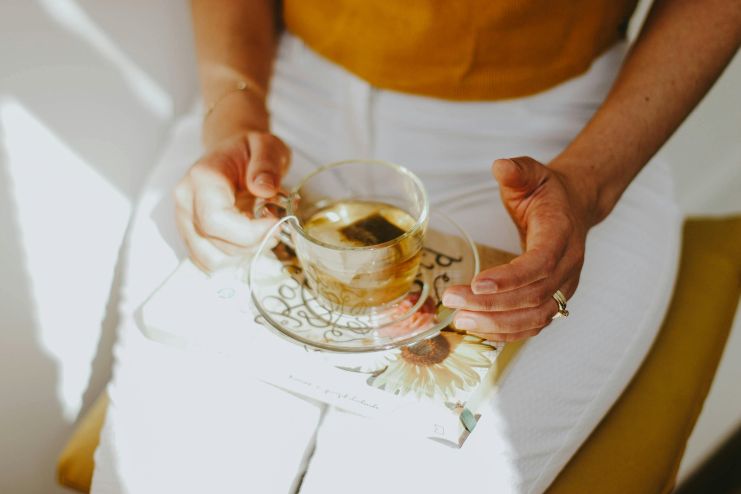
Having a cup of tea after a meal isn’t only a soothing habit. This habit has scientific evidence on its side. Here’s how the appropriate teas can help digestion and weight loss:
- Stimulates Digestive Enzymes: Certain herbal teas stimulate the production of digestive juices and bile, assisting your body in breaking down food more effectively.
- Reduces Gas and Bloating: Some teas decrease bloating and flatulence by easing the digestive system’s muscles.
- Boosts Metabolism: Some teas, particularly thermogenic teas, have a modest increase in metabolism and fat oxidation.
- Soothes the Gut: Relaxing teas can alleviate after-meal pain, particularly following heavy or fatty meals.
- Supports Liver and Detox: Several herbal teas mildly stimulate liver detoxing and decrease water retention.
Best Teas to Drink After Meals
Let’s look at some of the most effective herbal and functional teas you can sip after eating to improve digestion and support your slimming goals.
A. Peppermint Tea
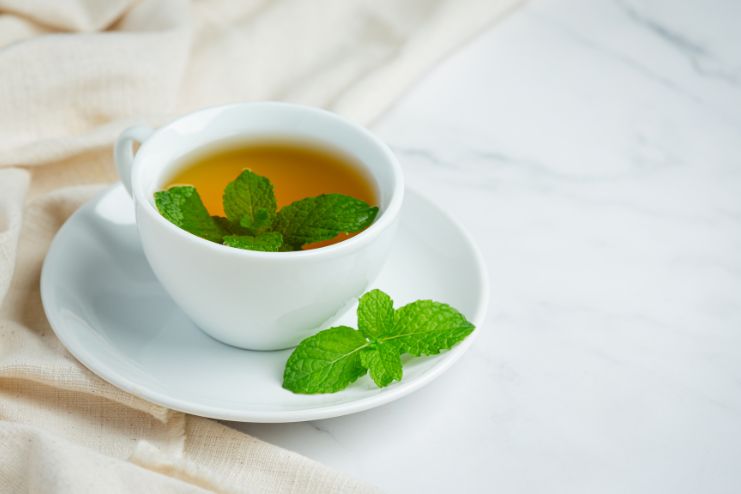
Peppermint tea is one of the best-selling after-dinner herbal teas, and it’s easy to see why. Made of peppermint leaves, this tea provides a soothing, cooling effect that can immediately relax the digestive system.
- Peppermint tea includes menthol, whose antispasmodic characteristics relieve intestinal muscle tension. It may ease cramps, gas, and bloating, particularly following a fat or greasy meal.
- Taking peppermint tea after meals promotes digestion by helping food and gas travel more smoothly through the intestines.
- It’s also helpful for individuals who suffer from IBS-like symptoms such as abdominal pain and irregular bowel habits.
Since it’s caffeine-free, peppermint tea is a wonderful nighttime choice, particularly if you feel bloated or gassy after supper.
Avoid peppermint tea if you have acid reflux or GERD since it can relax the lower esophageal sphincter and exacerbate symptoms.
If you wish to brew a tasty cup of peppermint tea, check out the popular Amazon Brand, Happy Belly Peppermint Herbal Tea Bags!
B. Ginger Tea
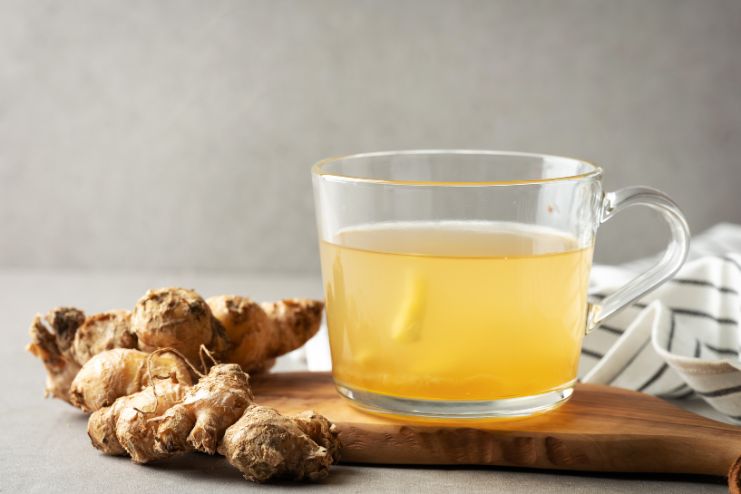
Ginger tea is a spicy, warm drink recognized throughout cultures for its potent anti-inflammatory and digestive effects. It is particularly beneficial if you get sluggish or queasy after meals.
- Ginger’s active ingredients, gingerols and shogaols, stimulate saliva, bile, and gastric enzymes, which are needed to digest food effectively.
- Ginger tea may accelerate gastric emptying, decreasing the bloated, overfull sensation after big meals.
- Its subtle thermogenic action (warming your body’s base temperature slightly) can assist in fat metabolism and circulation.
You can buy ginger tea, or go for Organic Ginger Powder
C. Fennel Tea
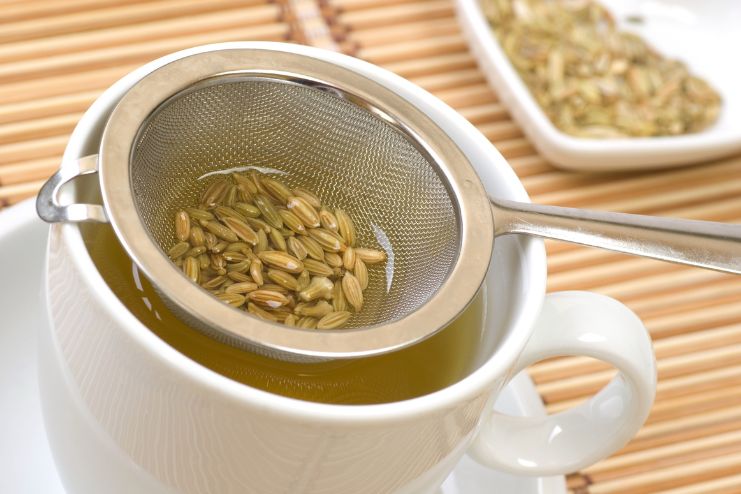
Fennel tea has long been a traditional digestive remedy across cultures, from Indian homes to Mediterranean cuisine. It is prepared from dried fennel seeds, which contain compounds such as anethole that relax muscles in the gastrointestinal tract and ease discomfort.
- Fennel tea, consumed after meals, can reduce gas, bloating, and cramping when digestion is slow.
- It induces gut motility while promoting smoother passage of food and waste through the intestines.
- Its diuretic action reduces puffiness and water retention, complementing a narrower look.
- Fennel tea contains a subtle sweet taste, ensuring it’s rewarding without adding sugar.
This digestive tea is beneficial after consuming heavy meals. This tea is a supportive agent in many Ayurvedic therapies to control digestive fire (Agni).
D. Chamomile Tea
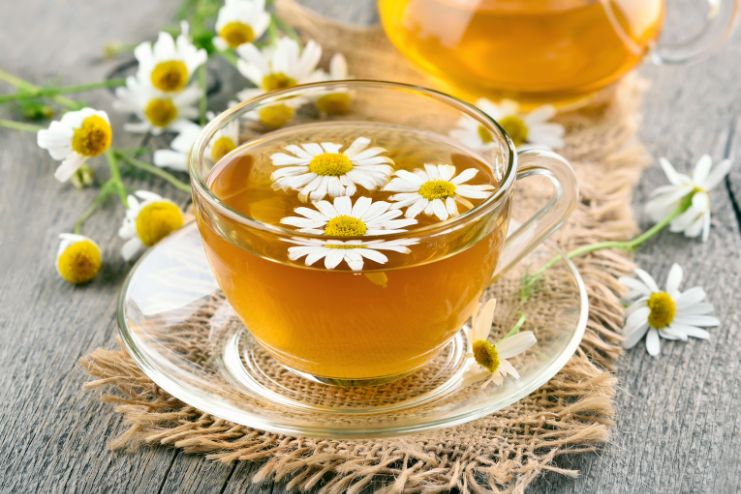
Chamomile tea is a soothing, relaxing herbal beverage that calms the mind and the digestive system. It’s a good choice after supper, especially if your meals are late or preceded by stress or acid reflux.
- Rich in apigenin, a natural relaxant compound, chamomile reduces inflammation in the intestine and eases stomach spasms.
- It also relieves symptoms of acid reflux by soothing the stomach lining and the esophagus.
- Perfect for those who suffer from post-meal stress, insomnia, or gut tension.
Chamomile is a caffeine-free anti-bloating tea that is best taken at night when you require digestive and nervous system nourishment.
E. Dandelion Root Tea
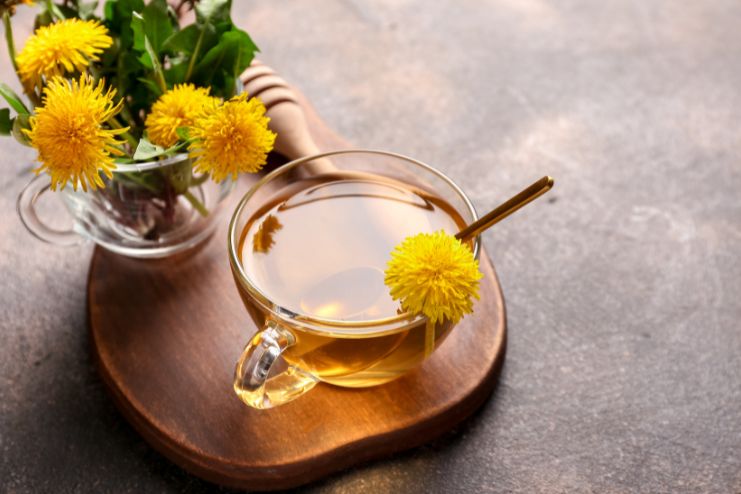
Not as well recognized as others, dandelion root tea is a powerhouse of liver support and digestion.
- It promotes bile production, which plays an essential role in the breakdown of fats, making it particularly helpful after fried or processed food.
- Due to its gentle diuretic action, it may also relieve puffiness, water retention after eating, and minor swelling.
- As a natural detox tea, it also mildly aids liver function, supporting your body’s natural cleansing mechanisms.
Though its earthy, slightly bitter flavor is an acquired taste, many individuals find it intensely satisfying and consume it regularly.
F. Green Tea (Lightly Brewed)

Green tea is usually associated with fat-burning, and with good reason. It’s packed with catechins, particularly epigallocatechin gallate (EGCG), which increases metabolism and improves fat oxidation.
- Green tea after light meals can mildly help digestion and thermogenesis if combined with exercise.
- It also provides a mild caffeine boost (unless decaffeinated), which may help with energy and alertness after eating.
- However, green tea can inhibit iron absorption, so avoid it after iron-rich meals or if you’re anemic.
Stick to light brewing (1–2 minutes) to keep it smooth and gentle on the stomach.
Twinings Pure Green Tea Individually Wrapped Bags are one of our favorite picks!
G. Pu-erh Tea
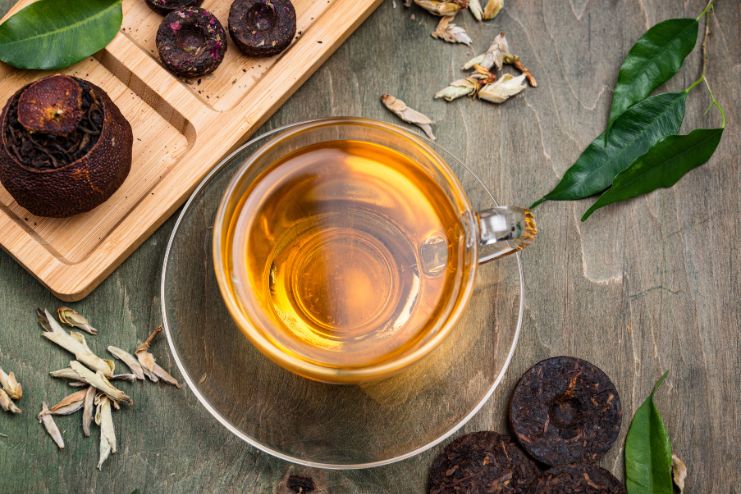
Pu-erh is Chinese fermented black tea, traditionally consumed to aid digestion and regulate fat metabolism after large meals.
- It is said to break down fat in the diet and help maintain healthy cholesterol levels, particularly by reducing LDL.
- Its unique microbial fermentation may help with gut bacteria and aid digestion, particularly after heavy meals of meat or oil.
- Pu-erh’s robust flavor profile makes it a dominant but reassuring pick for earthy tea lovers.
Unlike usual black teas, pu-erh may soothe the digestive system, especially when well-ripened and brewed.
H. Cumin-Coriander-Fennel Tea (Ayurvedic Blend)
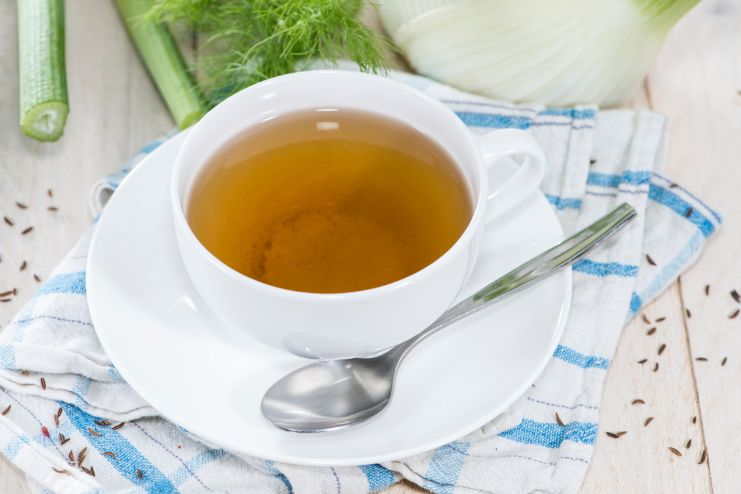
A traditional favorite of Ayurvedic medicine, this three-seed combination is CCF tea. It is extensively valued for its ability to balance digestion, slash bloating, and detoxify the body.
- Cumin is an agni stimulant and speeds up slow digestion.
- Coriander has mild cooling and cleansing properties that calm inflammation and help to cleanse the liver.
- Fennel, as described earlier, supports gut motility and calms gas.
- This blend is especially best for individuals who experience heaviness, drowsiness, or food cravings post-meals.
Daily intake of CCF tea can help manage appetite, bloating, and milder digestive detoxification without harsh impacts.
Read More: Cleanse Your Body Naturally: 6 Herbal Detox Supplements for Whole-body Cleansing
Tips for Drinking Tea After Meals
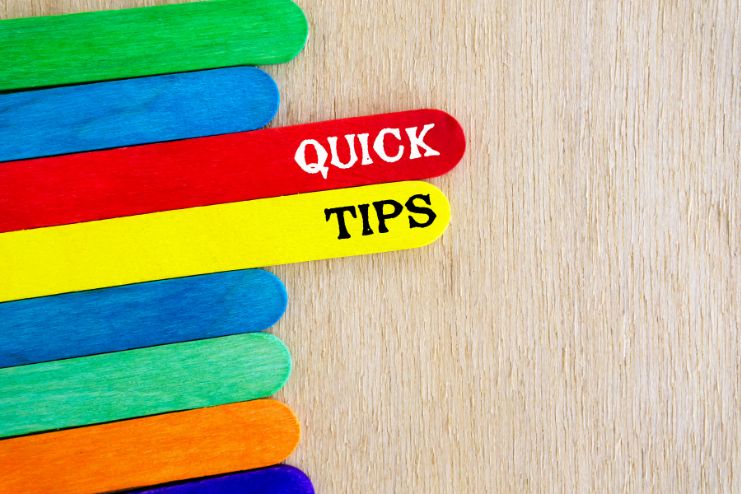
To get the most out of your digestion-boosting teas, keep these simple tips in mind:
- Wait 15–30 minutes after eating before sipping tea to avoid interfering with immediate digestion.
- Sip slowly. This isn’t a race; let the herbs work their magic gradually.
- Avoid drinking hot tea right after meals, especially if you’ve eaten something spicy or acidic.
- Skip the sugar. Add a few drops of lemon or raw honey to add flavor.
- For evening tea, opt for caffeine-free teas such as chamomile, fennel, or cumin-coriander-fennel.
Read More: Gut Health Hacks: The Best Morning Foods to Kickstart Digestion
Conclusion

A warm cup of herbal tea can be more than just comforting. It can improve digestion, reduce bloating, and gently support your weight goals.
Whether you’re fighting post-meal bloating, battling cravings, or just trying to fix yourself, these natural, anti-bloating teas can leave you feeling lighter and more balanced. Choose the ones that resonate with your body’s timing and make them a ritual after meals.
They’re not a magic fix, but when combined with mindful eating and a balanced lifestyle, these herbal teas lead to better health.
In this Article



















